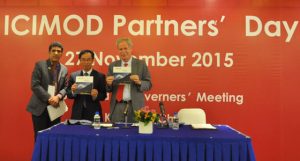This site uses cookies, as explained in our terms of use. If you consent, please close this message and continue to use this site.

To continue strengthening partnerships with Chinese organisations, the International Centre for Integrated Mountain Development (ICIMOD), Chinese Committee on ICIMOD (CNICIMOD) and Kunming Institute of Botany organised ICIMOD-China Partners’ Day in Kunming, 27 November 2015. Key objectives of the day were to provide a platform for mutual learning, networking opportunities, showcasing partners’ work, expanding partnerships and mobilising support for sustainable development challenge in the Himalayan region.
A regional organisation working with a network of partners in China, ICIMOD influences mountain development policies and practices to foster regional cooperation. ICIMOD’s regional programmes serve as an interface between their different initiatives and partners in China. As a founding member of ICIMOD thirty years ago, China continues to be instrumental in supporting ICMOD’s work. ICIMOD works with various national partners both on government and local levels to ensure ICIMOD’s response to the needs and priorities in China. Several Chinese universities joined the Himalayan University Consortium in 2015, hosted by ICIMOD.
The event was attended by ICIMOD’s board members from its eight regional member countries of the Hindu Kush Himalayan (HKH) region (Afghanistan, Bangladesh, Bhutan, China, India, Myanmar, Nepal, and Pakistan), independent board members, development partners, experts, as well as representatives of ICIMOD’s network of cooperation partners in China.
In his opening address David Molden, Director General of ICIMOD, emphasised the need for collaboration with Chinese organisations and highlighted the importance of community involvement.
Molden described ICIMOD’s role in the region as one to link partners and provide platforms which bring together people across the region for collective learning and knowledge sharing. He said the event provided an opportunity to shape the direction of the organisation’s support in the development of China’s mountain areas in the best possible ways. Molden emphasised the importance of knowledge sharing to mountain development challenges in the Hindu Kush Himalayan region.
Basanta Shrestha, Director of Strategic Cooperation at ICIMOD, thanked ICIMOD’s partner organisations in China for their coordination and continuing support. In the current medium term, ICIMOD has 11 strategic partnerships and 25 implementing partnerships in China. These partnerships demonstrate a collective endeavour in various areas related to mountain development. He further added, there are also emerging partnerships to tap the potential of China with diverse institutions including the private sector.
From the far west to the far east of the mountain range, partnerships between ICIMOD and Chinese cover: conservation and development in transboundary landscapes, climate change adaptation and livelihoods improvements, regional flood early warning and data sharing, and the scholarship scheme of the Himalayan University Consortium. Various partners presented their on-going works during the Partners’ Day.
Two books were launched at the event, ‘Gender Analysis of Climate Change Impacts in China with focus on Yunnan’ and ‘The Way to the Sacred Land: Cherishing the Wildlife and Traditional Culture of the Kailash Sacred Landscape’. The book on gender covers a study on climate change and gender undertaken by ICIMOD, the Yunnan Academy of Social Science, and the Kunming Institute of Botany under the Himalayan Climate Change Adaptation Programme (HICAP). The book on Kailash Sacred Landscape was co-published by the Kunming Institute of Botany and ICIMOD.
In his closing remarks Lars Erik Liljelund, an independent member of the ICIMOD Board of Governors, said ICIMOD’s goal is about quality of life for the people in the region. Liljelund stressed the importance of the growing family of partners in China and said the signing of two new memorandum of understanding by CNICIMOD, ICIMOD and the National Natural Science Foundation was an important development in achieving these goals.
Stay up to date on what’s happening around the HKH with our most recent publications and find out how you can help by subscribing to our mailing list.
Sign Up